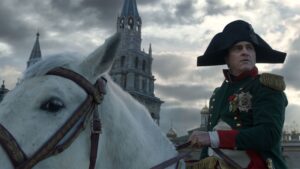
Very few directors do bombastic as well as Ridley Scott. He’s the man behind such epic costume dramas as “Gladiator,” “Exodus: Gods and Kings,” and “Kingdom of Heaven.” While I’ve liked some of his dramas that don’t take place in medieval times (e.g. “The Martian,” “Matchstick Men”), it’s the grand-scale historical movies he’s most famous for.
In “Napoleon,” with Joaquin Phoenix in the title role, Scott tries to combine the big and the small, with endless battle scenes competing for screen time against the warring French emperor’s relationship with Josephine (Vanessa Kirby), the woman he married but later divorced because she could not bear him a male heir. Through much of the story, Scott obsesses over Napoleon’s repeated attempts to get Josephine pregnant, gratuitously showing him mounting her doggie style several times, complete with the sound of skin slapping on skin. He did the same in the rape scenes of Jodie Comer’s character in “The Last Duel.” Yet despite so much time spent on Napoleon’s desire for a male heir, when one finally arrives via another woman, it’s the last we hear of the child.
As for the battle scenes, Scott doesn’t hold back one iota. There are several bloody shots of mens’ heads (and at least one horse) being blown off. It must have taken Scott as long to plan the huge battlefield scenes, with hundreds of extras, as it did for Napoleon to figure out his strategies. They both pay off, though I found it a bit repetitive seeing soldiers fighting with swords, bayonets, and muskets again and again.
At the end of the story, before the credits roll, there’s an on-screen note telling us that over eighteen years, Napoleon led his armies into sixty-one battles, though only six are depicted on screen. In the course of those wars, more than three million men lost their lives. Between that and the footage of dead bodies strewn across the land, there’s a lesson in the folly of large-scale combat. Especially where the only goal is to gain more land to control and expand a leader’s power.
Anytime you have to use voiceovers and on-screen graphics to keep the audience interested, you’ve failed at storytelling. Scott overdoes both of them, using the letters Napoleon sent to Josephine from battlefields, and those she sent in return. Perhaps he had to do so because of how hard it is to understand Phoenix, who mumbles through an uncharismatic portrayal of Napoleon. It’s also difficult to discern some of what the other military commanders are saying as they shout to their troops. Also, you’d never tell the movie plays out over three decades by the way Napoleon looks because Phoenix’s appearance barely changes.
In the end, the Napoleon that Scott depicts seems dissatisfied with nearly everything. So was I while watching the movie, which is why I’m giving it a 4 out of 10. Opens today in theaters.
